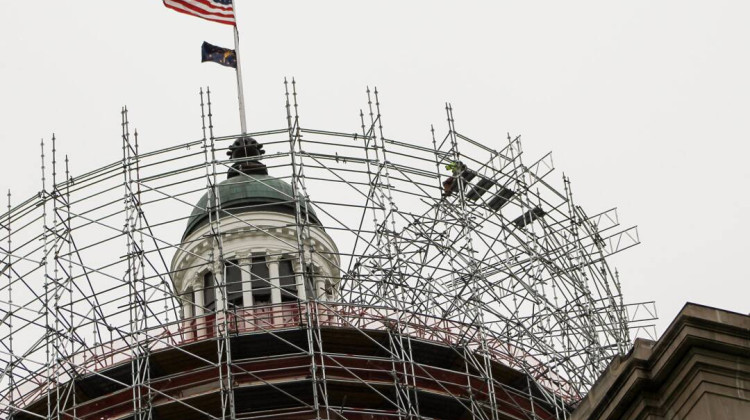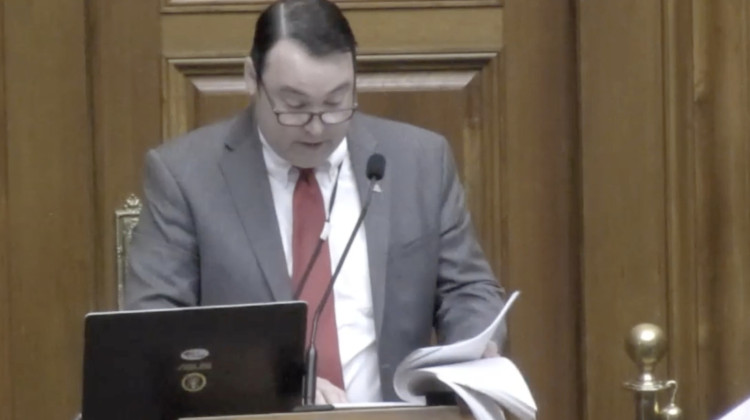
Every Indiana University campus and IU Online received funds for new success coach positions.
WFIU/WTIU NewsIndiana’s Commission for Higher Education awarded $2.4 million to 22 college campuses to create success coach positions.
The College Success Program grant will create 32 full-time positions at four-year private and public schools, according to a release. The coaches will focus on supporting five groups of students: 21st Century Scholars, Frank O’Bannon grant recipients, minority students, low-income and first-generation students.
The coaches will be the first point of contact for many students, and they’ll be “as much of a one-stop shop” as possible for students needing more resources, Senior Associate Commissioner and Chief Program Officer Michelle Ashcraft said.
“We're just really excited for the holistic level of support, from enrollment through employment, that these coaches could potentially provide these populations of students,” Ashcraft said.
Coaches are tasked with increasing enrollment, degree completion and connecting studentsto career opportunities. The first grant extends until Oct. 31, 2024, and Ashcraft said the commission will renew it for a second yearsince lawmakers funded it in the latest budget.
Colleges were required to submit sustainability plans to show how they will continue coaching positions after the grants end.
The coaches align with the commission’s HOPE agenda, Ashcraft said, which aims to see more Hoosiers of all backgrounds earn college degrees and credit.
The commission will check on a college’s progress using data and a few indicators.
At the end of the academic year, college’s report enrollment and degree completion data, Ashcraft said. That will be used to see if coaches had any impact on the five student groups. In the meantime, the commission will also monitor data from financial aid awards, FAFSA, and credit completion for scholars. For example, when students reapply for financial aid and complete 15 credits a semester, that tells the commission colleges are on the right track.
“We'll be looking towards increased enrollment for these five specific populations that are mentioned,” Ashcraft said. “Then for the existing students who are already on campus, who are maybe in their juniors and senior years, seeing if we see an uptick in completion rates.”
Why create funding for success coaches?
Ashcraft said the commission decided to invest in coaches after seeing other successful models in Indiana and around the U.S. One example Ashcraft provided is Purdue University’s student coaching in its Purdue Promise program.
Coaches show improvements in retention and college completion, Ashcraft said, and colleges tend to convert temporary coaching into permanent coaching after seeing success.
"We felt like we really had a proven model that was working, and investing in this further could help build capacity for campuses maybe where they don't have any capacity yet, or to further enhance those successful programs that are already across the campuses,” Ashcraft said.
House Bill 1001 outlined most of the criteria for the College Success Program grant, Ashcraft said, and the commission clarified the legislature’s language for the grant to colleges. The legislature specially allocated funds for low-income, Black, Latino and first-generation students.
By including five categories, Ashcraft said the grant captures the right student populations.
The 21st Century Scholars program and the Frank O’Bannon program are the state's largest financial aid programs for low-income students. Both of these programs are expanding, Ashcraft said, and by creating these coaches, the colleges will have a head start at serving more students.
“We want to invest in as many of our Hoosier students go into Hoosier campuses as much as possible,” Ashcraft said. “And knowing the diversity of that population, this will give campuses that sort of a jumpstart on, on preparing for what that potential influx of students may look like down the road.”
Which Indiana colleges got a piece of the funding?
Each Indiana University campus and Indiana University Online will receive funding for a coach. These coaches will focus on “admission, enrollment, persistence, completion and
post-graduate attainment for all 21st Century Scholars,” according to the commission.
Purdue West Lafayette and Fort Wayne will also create a coach position for 21st Century Scholars. Purdue Northwest received funds for “ driving college enrollment, persistence, completion and post-graduate retention for Black and Latino and Hispanic students.”
Anderson College, Ball State University, Franklin College, Marian University in Indianapolis, University of Indianapolis and Vincennes University will also create positions to support and recruit students in the 21st Century Scholars.
Indiana State University will create two positions, according to the commission. The first coach will focus on outreach to first-generation students of color to apply and enroll at ISU. The other coach will welcome and help the students adapt in their first weeks in college.
The University of Southern Indiana will use the investment to provide an "immersive" experience to first-generation students.
A full list of colleges and their plans with the grant can be found on Learn More Indiana's website.
 DONATE
DONATE






 Support WFYI. We can't do it without you.
Support WFYI. We can't do it without you.